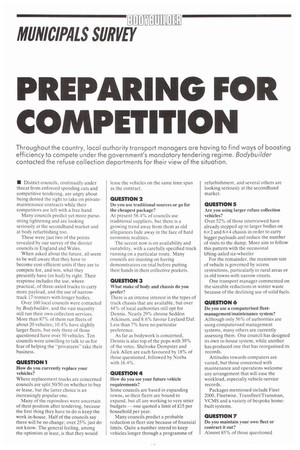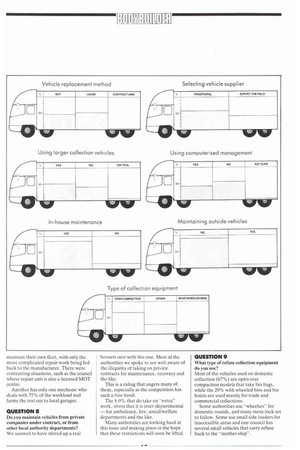PREPARING FOR COMPETITION
Page 118

Page 119

If you've noticed an error in this article please click here to report it so we can fix it.
• District councils, continually under threat from enforced spending cuts and competitive tendering, are angry about being denied the right to take on private maintenancecontracts while their competitors are left with a free hand.
Many councils predict yet more pursestring tightening and are looking seriously at the secondhand market and at body refurbishing too.
These were just two of the points revealed by our survey of the district councils in England and Wales.
When asked about the future, all seem to be well aware that they have to become cost-efficient units if they are to compete for, and win, what they presently have (or had) by right. Their response includes the use, where practical, of three-axled trucks to carry more payload, and the use of narrowtrack 17-tonners with longer bodies.
Over 160 local councils were contacted by Bodybuilder, and the vast majority still run their own collection services. More than 87% of them run fleets of about 20 vehicles; 10.4% have slightly larger fleets, but only three of those questioned have over 50 vehicles. Ten councils were unwilling to talk to us for fear of helping the "privateers" take their business.
How do you currently replace your vehicles?
Where replacement trucks are concerned councils are split 50/50 on whether to buy or lease, but the latter choice is an increasingly popular one.
Many of the repondees were uncertain of their position after tendering, because the first thing they have to do is keep the work in-house. Half of the councils say there will be no change; over 25% just do not know. The general feeling, among the optimists at least, is that they would lease the vehicles on the same time span as the contract.
Do you use traditional sources or go for the cheapest package?
At present 58.4% of councils use traditional suppliers, but there is a growing trend away from them as old allegiances fade away in the face of hard economic realities.
The accent now is on availability and suitability, with a carefully specified truck running on a particular route. Many councils are insisting on having demonstrators on trial before putting their hands in their collective pockets.
What make of body and chassis do you prefer?
There is an intense interest in the types of truck chassis that are available, but over 44% of local authorities still opt for Dennis. Nearly 29% choose Seddon Atkinson, and 8.6% favour Leyland Daf. Less than 7% have no particular preference.
As far as bodywork-is concerned, Dennis is also top of the pops with 39% of the votes. Shelvoke Dempster and Jack Allen are each favoured by 18% of those questioned, followed by Norba with 16.4%.
How do you see your future vehicle requirements?
Some councils are based in expanding towns, so their fleets are bound to expand, but all are working to very strict budgets — one quoted a limit of £15 per household per year.
Many councils predict a probable reduction in fleet size because of financial limits. Quite a number intend to keep vehicles longer through a programme of refurbishment, and several others are looking seriously at the secondhand market.
Are you using larger refuse collection vehicles?
Over 52% of those interviewed have already stepped up to larger bodies on fix 2 and 6x4 chassis in order to carry bigger payloads and reduce the number of visits to the dump. More aim to follow this pattern with the occasional lifting-axled six-wheeler For the remainder, the maximum size of vehicle is governed by access restrictions, particularly in rural areas or in old towns with narrow streets.
One transport manager commented on the sizeable reductions in winter waste because of the declining use of solid fuels.
Do you use a computerised fleetmanagement/maintenance system? Although only 56% of authorities are using computerised management systems, many others are currently assessing them. One council has designed its own in-house system, while another has produced one that has reorganised its records.
Attitudes towards computers are varied, but those concerned with maintenance and operations welcome any arrangement that will ease the workload, especially vehicle-service records.
Packages mentioned include Fleet 2000, Fleetwise, Transfleet/Transman, VCMS and a variety of bespoke homebuilt systems.
Do you maintain your own fleet or contract it out?
Almost 85% of those questioned maintain their own fleet, with only the more complicated repair work being fed back to the manufacturer. There were contrasting situations, such as the council whose repair unit is also a licensed MOT centre.
Another has only one mechanic who deals with 75% of the workload and farms the rest out to local garages.
Do you maintain vehicles from private companies under contract, or from other local authority departments? We seemed to have stirred up a real hornets nest with this one. Most of the authorities we spoke to are well aware of the illegality of taking on private contracts for maintenance, recovery and the like.
This is a ruling that angers many of them, especially as the competition has such a free hand.
The S.0% that do take on "extra" work, stress that it is inter-departmental — for ambulance, fire, social/welfare departments and the like.
Many authorities are looking hard at this issue and making plans in the hope that these restrictions will soon be lifted. What type of refuse collection equipment do you use?
Most of the vehicles used on domestic collection (67%) are open-rear compaction models that take bin bags, while the 29% with wheeled bins and bin hoists are used mainly for trade and commercial collections.
Some authorities use "wheelies" for domestic rounds, and many more look set to follow. Some use small side loaders for inaccessible areas and one council has several small vehicles that carry refuse back to the 'mother-ship'.














































































































































































